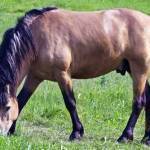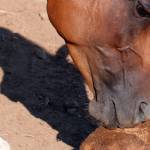Rely on Fecal Egg Counts for Deworming PPID Horses

Rumors persist that horses with pituitary pars intermedia dysfunction (PPID, equine Cushing’s disease) may have suppressed immunity that increases their susceptibility to intestinal parasitic infections. The available data, however, are limited and conflicting. A study was performed showing some, but not all, PPID horses may reestablish parasite infections quickly after deworming, highlighting the need for individual fecal egg count monitoring.*
Historical data from 2010 show that horses with PPID were more susceptible to strongyle infection than healthy horses. As such, recommendations were made to frequently deworm PPID horses. However, we now know that overusing chemical dewormers, known also as anthelmintics, accelerates the selection of drug-resistant parasites.
“There is already widespread resistance to some of our dewormers, with some parasites developing resistance to multiple drugs. To preserve the efficacy of the remaining anthelmintics, fecal egg counts are recommended to target the use of specific anthelmintics for specific parasites. Deworming without knowing how many and what types of parasites are present only helps breed resistant parasites,” explained Ashley Fowler, Ph.D., a Kentucky Equine Research nutritionist.
Australian veterinary researchers recently revisited whether PPID horses are more susceptible to intestinal parasites. They conducted a study designed to monitor and compare egg shedding of small strongyles, also referred to as cyathostomins, in healthy horses and those with PPID.
Forty-five horses and ponies were included in the study, fourteen of which were diagnosed with PPID based on ACTH blood levels and clinical signs. All horses were dewormed on day 0 of the study and fecal egg counts were performed every 14 days for 98 days (14 weeks).
This study found:
- Fecal egg counts were higher in the PPID horses on days 56 and 70 only;
- By day 84, fecal egg counts were similar between PPID horses and healthy horses;
- Fecal egg accumulation rate was higher in horses with PPID over the 14-week study period;
- Egg reappearance after deworming was shorter in the PPID horses; and
- By day 42, 30% of horses with PPID had fecal egg counts greater than 200 eggs per gram of feces, while none of the healthy horses had any eggs detected at this time point.
“That said, some horses with PPID had either no detectable eggs or low fecal egg counts, less than 200 eggs per gram of feces,” Fowler said.
A few explanations for these data exist. Possibly, the immune system of PPID horses may be compromised or an altered host-parasite relationship may develop. For example, the researchers suggested that strongyle larvae were not arresting in an encysted stage in PPID horses as usual and were developing straight to egg-laying adult parasites.
Regardless of PPID status, these data confirm that all horses should be strategically dewormed based on fecal egg counts.
“To support the immune systems of horses with PPID, meeting all of the horse’s mineral and vitamin requirements is essential. A ration balancer or vitamin-mineral supplement are appropriate choices for PPID horses. In particular, vitamin E can help support immune function,” said Fowler.
*Horner, A., N.J. Bamford, M.J. Stear, D. Piedrafita, A. Jabbar, K.J. Hughes, C.M. El-Hage, and S. Preston. 2024. Strongyle egg shedding and egg reappearance periods in horses with pituitary pars intermedia dysfunction. Veterinary Parasitology 328:110176.








